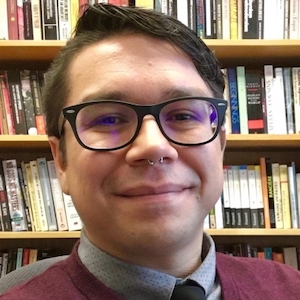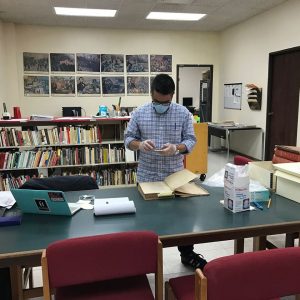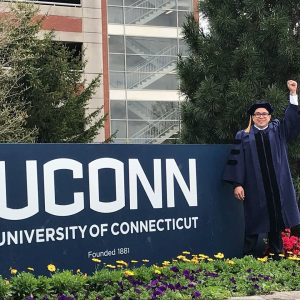My community was not only contained within Wood Hall, but as a first-gen Latinx scholar, I was really grateful for the existence of El Instituto. It served as a hub for cross-campus dialogue, exchange, and solidarity. It was through, and thanks to, our community that my family and I were able to feel warmth in the coldest of New England winters.
 1) How did you decide to pursue a PhD at UConn? What was your academic focus coming into the program, and how did that evolve over the course of your studies?
1) How did you decide to pursue a PhD at UConn? What was your academic focus coming into the program, and how did that evolve over the course of your studies?
As a historian of Puerto Rico, the Caribbean, and Latin America, I was drawn to UConn’s History Department because of Blanca G. Silvestrini. She was part of a generation of scholars that re-shaped Puerto Rican and Caribbean historiography. Silvestrini was also well known in Puerto Rico because she had co-authored a history textbook for the public school system.
When I was looking into graduate programs, Francisco Scarano—now Emeritus Professor of History at the University of Wisconsin—suggested I get in touch with Silvestrini. Scarano knew the program well; he had also been a member of UConn’s History faculty in previous years.
I arrived at Storrs with a preconceived idea of what I wanted to develop in my dissertation. It was an ambitious transnational history of cigar makers in Cuba, Puerto Rico, and Tampa. The project greatly changed as I advanced through the program. However, the guiding theme remained: the circulation of radical ideas from the standpoint of working-class intellectual communities.
My experiences at UConn shaped my intellectual frameworks and now guide my scholarship. I have transformed my dissertation into a book manuscript (under contract with Duke University Press) and I continue to explore the transnational circulation of ideas in my next monograph-length project about workers, radicals, and intellectuals in Havana, Buenos Aires, and Nueva York.
2) What was your experience as a graduate student in the History Department? What is your most memorable experience from the History classroom?

Being a first-gen student with a family, graduate school was sometimes financially and socially hard. However, it was an intellectually enriching experience. I cannot stress the impact that the brilliance of our faculty roster had on my scholarly development. I cherished every conversation with Blanca
Silvestrini, Mark Overmyer-Velázquez, Mark Healey, Melina Pappademos, and Michael Dintenfass, among many others. I also greatly benefited from meeting with our invited speakers, often creating bonds of friendship and collegiality that I still maintain now as a faculty member.
I am particularly grateful for HIST 5101 with Janet S.K. Watson and HIST 5102 with Nina Dayton. Throughout that yearlong seminar, I was able to develop, research, and produce an article manuscript that was eventually published in Caribbean Studies Journal. I still treasure and constantly use the writing and research strategies that we collectively developed in the classroom.
3) What skills did you gain from the doctoral program, and how did the program help prepare you for your career?
Each seminar was a space to test ideas that were of interest to me but through a particular theme or topic. That is, most of the papers I wrote for my courses were geared towards questions that I wanted to further explore in my dissertation. This did not mean that I only took seminars directly related to my research. For example, I took a Critical Race Theory course with Charles R. Venator-Santiago through El Instituto, a course on Peronism with Mark Healey, and a Human Rights seminar with Blanca Silvestrini.
Another aspect that I greatly appreciated about the program was that it allowed us to be teaching assistants for courses outside of our research specializations. For example, I was able to be a T.A. for courses that ranged from Nazi Germany (with Charles Lansing) to gender and sexuality in Modern Europe (with Sylvia Schafer). Furthermore, I cannot help but miss the intellectual vibrancy of the department, much of which also happened in hallways, in-between seminars or public talks.
4) What is one piece of advice that you would give to current graduate students?
Before arriving at UConn, I had been an active member of a punk community, had worked in multiple fast-food restaurants, and had been a high school history teacher. Thus, having to dedicate my time to intellectual pursuits was something that I had only dreamt about. During my time at UConn, I never took a minute for granted. While graduate school is hard and everyone’s experience is unique (positionality, for example, greatly matters), it’s also a space where your job is to produce knowledge with the support of a community of peers and senior colleagues.

From the punk community I also learned that all we’ve got is each other. I was fortunate enough to be part of a multi-generational cohort that uplifted and supported each other. This entailed being there for each other beyond books, papers, and talks. Knowledge production is a collective endeavor, and it can be quite radical when you acknowledge that and celebrate it with those that helped you along the way.
My community was not only contained within Wood Hall, but as a first-gen Latinx scholar, I was really grateful for the existence of El Instituto. It served as a hub for cross-campus dialogue, exchange, and solidarity. It was through, and thanks to, our community that my family and I were able to feel warmth in the coldest of New England winters.
The neo-liberal academia atomizes individuals and promotes a market-based subjectivity that encourages competition. Some simple things like looking out for each other, celebrating each other, and caring for each other can be quite radical. Ultimately, I say all of this to stress the importance of community.